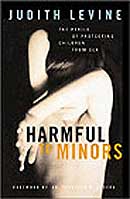By Marisa Helms
Minnesota Public Radio
August 13, 2002
Last spring, the University of Minnesota Press was at the center of a storm of protest over the publication of a book on sex education. Some representatives of the local media admit deadline pressures at the time kept them from in-depth coverage of Judith Levine's controversial book Harmful to Minors: The Perils of Protecting Children from Sex. Levine met with with reporters and the public Monday night to discuss the media firestorm that erupted -even before her book was published.
| |
|
|
|
||
Harmful to Minors is a critique of the way sex education is taught in America. Author Judith Levine argues children are not well served if they're taught sex is dangerous and wrong. She says since children are sexual, they ought to be given as much information about sex so they can make informed decisions.
Levine's discussion of the legal and moral underpinnings of the age of consent got the most attention in the media, even before the book was published. In the book, she considers the possibility that sex between an adult and a teen may not always be damaging to the child.
Criticism of the book was swift and harsh. Conservative commentators called Harmful to Minors evil. And before the book was in stores, House Majority Leader and Republican gubernatorial candidate Tim Pawlenty called the book "trash," and tried to get the University of Minnesota Press to stop publication. The University did not stop publication, but it did launch a review of the U of M Press' editorial policies.
At a community forum attended by about 150 people, including journalists and members of the public, Levine described the personal humiliation she experienced because of the attacks on her book.
"Not only are my ideas depraved - if that's not enough, I am personally depraved. And this is the part that really hurts. And it doesn't just happen to me, it happens to sex educators in small towns this country over," Levine said. "A Los Angeles talk show host began by asking me if I was a mother - this is a real crime. 'No, I am not a mother. I have a niece and nephew.' 'Do you touch your niece and nephew?' 'Yes, I touch my niece and nephew.' 'How do you touch your niece and nephew?' And the next question was, 'At what age would you touch your niece and nephew to initiate them into sex?'"
The forum aimed to discuss why Levine's arguments about sex education were ignored, in favor of sensationalist coverage of one small element in her book.
Star Tribune editorial page editor Jim Boyd said if coverage of the story initially lacked depth, that's only because of competition with other breaking news.
"In the week when this controversy broke, all hell was breaking loose in the Middle East, the Legislature was tied in knots, and I had two people on leave. But the issue of sex education - to come back to this issue is always there - and we can do that any time when we have the time and the staff to do it," Boyd said.
Some media critics call this the "deadline excuse," and they say it's really an excuse for editorial squeamishness.
The Minnesota chapter of the National Lesbian and Gay Journalists Association sponsored the forum. The local chapter's Ken Darling says reporters and editors need to be aware of the agendas of the people involved in their stories.
"I think we heard that when it comes to sex ed, a lot of the people have a very profound agenda that is not exactly mainstream. And the press in some ways got duped," Darling said.
The forum included some spirited discussion.
Cullen Bailey Burns of Minneapolis attended. As a mother of a teen, she says she agrees that sex education in schools is political. She also agrees with Levine's premise that sex education is punitive, and based on fear.
"I think it's half the story. The other half of the story is a hard one to tell. And it's hard as a parent to talk to your child about it, because kids don't want to talk to their parents about that stuff, and I'm sure it's hard in schools to talk about it. But I think it's pretty clear there's a vocal minority in society that doesn't want it talked about at all," said Burns.
Controversy hasn't been all bad for Levine. At one point, Harmful to Minors reached number 16 on Amazon.com's list of best sellers.
More from MPR
